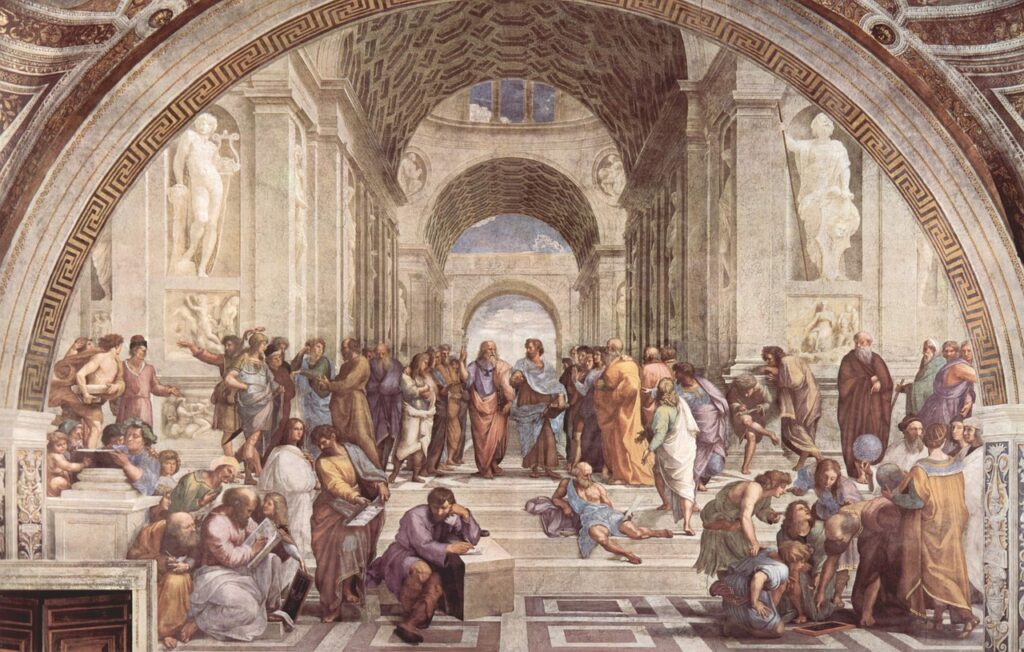Introduction
I am beginning a series on philosophy alongside series on systematic theology. I imagine my two projects coexisting as a body of truth: one of which consists of natural truths attainable through human reason and the other consisting of supernatural truths attainable through divine revelation. Tertullian’s famous question asks what the relationship between this two disciplines are: “What does Athens have to do with Jerusalem?” The question represents by way of metonymy two abstract ideas: the Greek mind and the Hebrew mind. The Greek mind represents a way of thinking through pure rationality in philosophical pursuits while the Hebrew mind represent a way of thinking through narrative fashion by the assent of faith in theological matters. Some have supposed a striking dichotomy between these two; however, both are necessary in the pursuit of truth, and neither should be diminished for the other. One cannot conflate the two, but one should also not entirely separate the two. Philosophers (i.e., the Greek mind) come to truth using human reason, which mankind is gifted by God with, being made in the imago Dei. Philosophy concerns itself with natural truths attainable without divine revelation, such as the need for a purely actual actualizer. On the other hand, theologians come to truth through faith in divine revelation which reveals supernatural truths not attainable through reason alone. For example, one can never deduce from pure reason that God exists in tri-unity. With philosophy, mankind can assent to the existence of God but cannot assent using reason alone to the tri-unity of him. Moreover, faith trusts that God is also mankind’s savior rather than merely God as creator which philosophy can bring us to. The distinction between ‘Athens’ and ‘Jerusalem’ becomes apparent with these observations; however, both are related. In matters of faith, one can use reason to come to necessary conclusions from principles laid out in Scripture. Furthermore, a philosopher must never contradict true theology for natural truths are subjugated to supernatural truths. Thus, to not err in defect (philosophy is useless) or in excess (philosophy supersedes theology), one must maintain a careful distinction between the two, yet still use both in either area of knowledge—faith or reason. The system of truth laid out in this series acts as a handmaiden does to a queen, namely theology.
What is Philosophy?
Philosophy is nominally defined as the love of wisdom. In Greek, philo means love and sophia means wisdom which were combine together to create the word philosophia. Wisdom can mean many different things such as virtue or skill in a given art. However, it is used here to denote sublime knowledge, a knowledge that comes through understanding something by causality. As Aristotle explains, “Knowledge is the object of our inquiry, and men do not think they know a thing till they have grasped the ‘why’ of it (which is to grasp its primary cause)” (Physics Bk. II, Ch. III). Philosophy essentially defined is the science of things through their first causes under the light of natural reason. It assumes the genus of science due to it arriving at certain knowledge and it can also be considered a wisdom because it is concerned with first causes, i.e. ultimate causes of all things by which we truly know (have scientia) of a given thing. Moreover, the phrase “under the light of natural reason” distinguishes the discipline from theology which arrives at certain knowledge through divine revelation. Under the two intellectual virtues of wisdom and science, philosophy is a speculative discipline rather than practical. A speculative discipline’s end is knowledge of truth while a practical discipline’s end is a work. Being under the genus of two theoretical intellectual virtues it follows the philosophy as a whole is speculative as well. Thus, the goal of philosophy is the attainment of truth which is defined as that which corresponds to reality.
Why Study Philosophy?
In the modern world, if something is not practical, it is useless. All pursuit of truth for the sake of knowing truth is deemed futile and unproductive. However, studying philosophy, although a speculative discipline, is not futile for three reasons. Firstly, knowledge is the perfection of the intellect. Everything naturally seeks its own perfection, and therefore, man has a natural desire to know even if it does not produce an external work. Secondly, attaining knowledge is the operation of the intellect, and thus without the attainment of knowledge, the operation becomes useless and does not reach its perfective end. Finally, our rationality images God who perfectly knows all things. Our attainment of truth is us, as Kepler says, thinking God’s thoughts after him. By philosophy, we attain knowledge of the highest causes which gives us true wisdom. Therefore, philosophy is not a futile discipline, but rather it attains the perfective end of the intellect whereby we reflect God’s own nature. If philosophy gives man one of his proper ends which he naturally desires, why do some not study philosophy? There are many practical reasons such as the necessities of life taking up time, wanting pleasurable experience rather than intellectual contemplation, and also laziness or cowardice. For example, some simply think they are not smart enough to grasp higher truths or do not want to spend time in the attainment thereof. Philosophy is no easy pursuit; however, it is worth it.
Historical Origin of Philosophy
Due to man’s natural desire to understand the ‘why’ behind things, many people began trying to figure out the basic principles or causes of the material world. For example, Thales posited that water was the basic principle of the world while Anaximander posited that an infinite being was behind all things. Following discussion of the basic building blocks of the world, philosophers began concerning themselves with what change is. Heraclitus, commonly known for his statement on change, says “The only constant is change.” He believed that everything was in constant flux. On the other hand, the Eleatic school believed that change was just an illusion. The dialogue also developed into the origin of good with Anaxoragas posting that it must come from intelligence. After these various schools of thought, called pre-Socratic philosophy, three more well-known philosophers came into the spotlight: Socrates, Plato, and Aristotle. Socrates was concerned with right formations of concepts and Plato famously taught a transcendental realm of forms. Aristotle departing from Plato, held that we could know things, not by reaching some transcendental realm, but by understanding the causes of certain things in this world. These foundational philosophers laid the groundwork of discussions that would be debated in the millennia following them.
Division of Philosophy
Philosophy contains multiple studies within itself. It is divided into speculative and practical. Speculative philosophy is divided into rational philosophy or logic which is the science of beings of reason and real philosophy which is concerned with real beings that exist outside our mind. Real philosophy is further divided into philosophy of nature which is concerned with spatio-temporal being and metaphysics which is concerned with being as being. Practical philosophy studies how man should act to attain his end which is divided into three: ethics (individual acting), economics (operations of domestic society), and politics (operation of civil society). The series will start with logic which is the instrument of how we attain truth.
Conclusion
Philosophy is a broad discipline that seeks to understand higher truths which satisfies man’s natural desire to attain knowledge. Therefore, all people should study philosophy since it undergirds the very reality in which we live. This marks the start of another series that I will probably never finish but it provides a handmaiden to theology which uses philosophical tools to help support the truth it attains. By studying philosophy, we perfect our intellectual virtues and understand the reality God has created for us to understand. In the next article, we will begin our study of logic.

